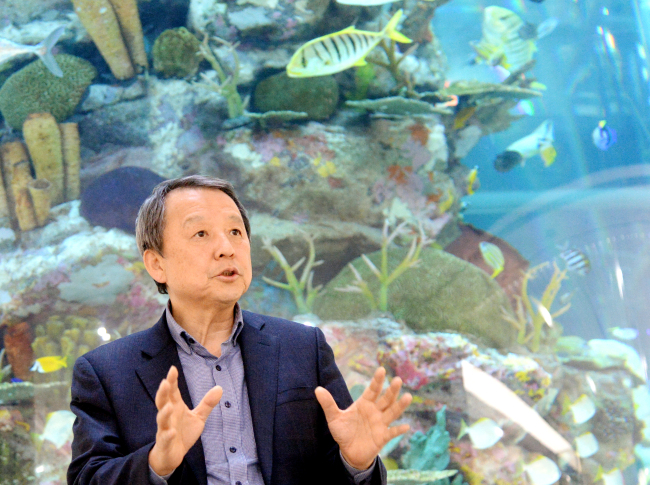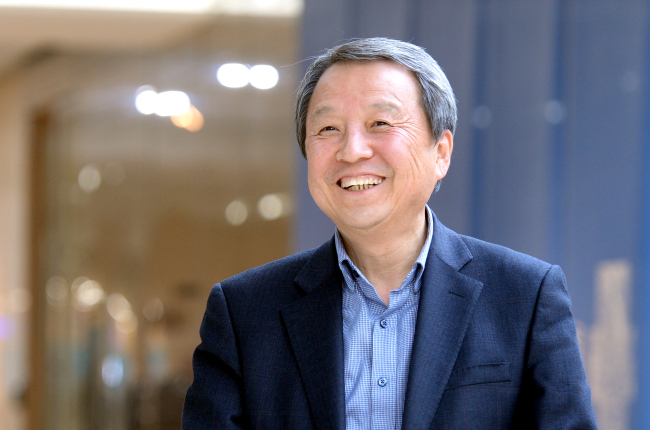[Herald Interview] Jeju expo to promote EV mass market, seek diversity
By Cho Chung-unPublished : March 5, 2017 - 17:45
Despite the overflowing expectation on electric vehicles, often lauded as the future of the auto industry, the actual market for zero emission cars has been growing at a very slow pace.
The portion of EVs around the world accounts for 0.01 percent of the total. But Kim Dae-hwan, chairman of the International Electric Vehicle Expo, believes that a significant change in the industry may happen this year, starting from an unlikely place -- the South Korean resort island of Jeju.

“This year will see the rise of the second-generation EVs that have driving ranges more than 380 kilometers per charge. And they would lead the formation of the EV mass market,” said Kim in an interview with The Korea Herald in Seoul.
The chairman was referring to GM Korea’s compact EV Bolt and Tesla’s S 90D set to make market debuts here this month. But he was also highlighting diverse lineups of EVs developed by small- and medium-sized part makers to be unveiled at the annual international EV Expo later this month in Jeju, including the first homegrown EV bus produced by a Korean company. Kim has been organizing the event for the last four years.
The fourth round of the annual exhibition on EVs kicks off on March 17 for a six-day run at Yeomiji Botanic Garden of Jungmun Resort in Jeju. The annual gathering of experts, government representatives and businesses is the world’s first and only expo on electric vehicles and components. About 200 businesses including carmakers and part-makers are expected to participate in the event to discuss the future of EVs and the eco-revolution, the chairman said.
On the sidelines of the expo, the first international forum on self-driving cars will be held, along with test-driving events. Major carmakers including Hyundai and Kia, BMW and Renault Samsung participate in the event. Tesla which starts its official sales in Korea on March 15, has not confirmed its participation yet, he said.
Keynote speakers include the world’s leading business and political leaders.
William Li, founder and chairman of NextEV, a Silicon Valley-based EV Chinese EV maker and James Shannon, president of the International Electrotechnical Commission headquartered in Geneva are among many. South Korean ministers for environment, transport and commerce, and other government representatives from Bhutan, Malaysia, the Philippines and Indonesia will travel to Jeju to take part in the expo.
“The expo is an Olympic for EVs and a global platform for EV experts and businesses, like the Davos Forum in Switzerland,” he said. “This year’s highlight will be B2B companies demonstrating their talents and potential as EV makers.”

The production of fossil fuel-powered vehicles have long been monopolized by a few major carmakers due to the complexity of internal combustion engines. But with zero emissions, operated by electric motor with energy delivered from rechargeable battery packs, the market will become more open and diverse. This means that the new market would offer larger choices to motorists and larger opportunities for automakers, he said.
“With tougher pollution rules kicking in, the world is bound to have more EVs on the roads. Germany is set to ban the sales of conventional fossil fueled vehicles by 2030, and in Paris, you can’t drive diesel cars.
“Traditional players should stop resisting the change but should start to embrace. The world will see more demand on EVs customized to suit different needs.”
With the size of the expo growing every year, Kim hopes to turn Jeju a perfect testbed for EVs under development.
The self-governing province plans to become a carbon-free island by 2030 with vehicles all operated by electric batteries. Jeju has an electric vehicle charging station in every 3.5 square kilometer, with a full policy support. Jeju Gov. Won Hee-ryong is known to be an enthusiastic EV driver.
By Cho Chung-un (christory@heraldcorp.com)



















![[Today’s K-pop] Treasure to publish magazine for debut anniversary](http://res.heraldm.com/phpwas/restmb_idxmake.php?idx=642&simg=/content/image/2024/07/26/20240726050551_0.jpg&u=)